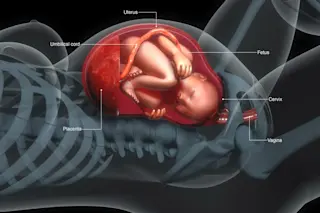Scientists are trying to learn more about the placenta, which plays a fundamental role in creating a healthy baby. (Credit: sciencepics/shutterstock) More than 15 percent of women in developed countries suffer from pregnancy complications associated with the placenta, the disk-shaped organ that sustains a growing fetus. Now researchers find the placenta adapts when nutrients are scarce. The discovery identifies possible targets for intervention, the researchers say. “Pregnancy complications are [often] linked to poor placental growth and function,” said Amanda Sferruzzi-Perri, a physiologist and developmental biologist at the University of Cambridge in the United Kingdom, who led the new research. “However, we lack information on what determines how well the placenta grows and functions to support fetal growth during a healthy pregnancy, let alone when the mother is challenged by a suboptimal environment.”
The placenta is a temporary organ that sprouts a baby’s umbilical cord. The organ then provides the oxygen ...














